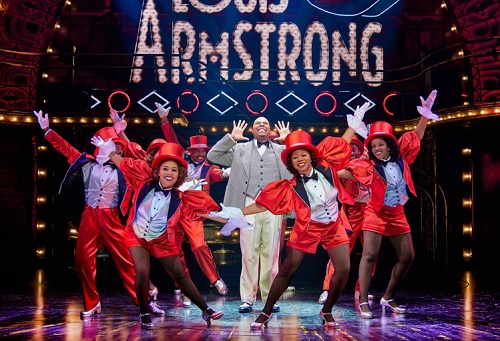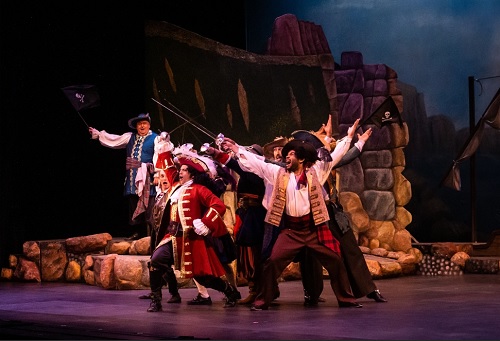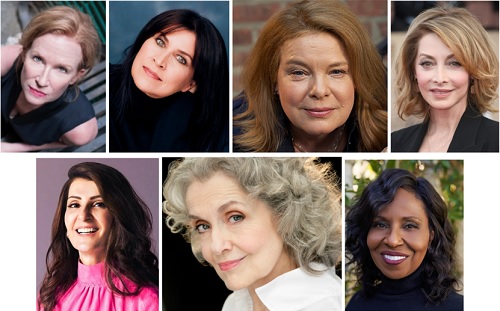NYC News
Review: A Wonderful World Has A Wonderful Cast
November 11, 2024, 11:19.52 pm ET

Photo: Jeremy Daniel
By Brian Scott Lipton
The 1928 standard “When You’re Smiling” tells us “When you’re smiling, the whole world smiles with you.” And in the new bio-musical “A Wonderful World: The Louis Armstrong Story,” now at Studio 54, it’s undeniably true that when the show’s star -- an unrecognizable James Monroe Iglehart doing an utterly remarkable vocal and physical imitation of the titular jazz icon – is singing that tune, the whole audience is probably doing the same.
Meanwhile, when Iglehart is merely smiling – Armstrong’s almost-constant facial impression -- at least some of the audience knows just how much Armstrong is covering up his pain, having been treated like many African Americans as a second-class citizen despite his fame. Unfortunately, that message doesn’t always clearly come through in Aurin Squire’s hopelessly muddled book, which, among many other faults, puts too much of a shiny gloss on Armstrong’s life. (You’ll find more of the facts – and the truth – in Armstrong’s Wikipedia entry!)
The book’s many flaws aside (more later), you can have a very good time at the show, especially when its first-rate cast, gorgeously costumed by the great Toni-Leslie James, cavorts on Adam Koch and Steven Royal’s vast and ornate set, often indulging in Rickey Tripp’s spirited choreography and raising their voices to the rafters.
Without question, Iglehart is first among equals, and it’s a treat to hear him sing many of Armstrong’s signature tunes, such as “(I’ll Be Glad When You’re Dead), You Rascal You,”, Oh, When the Saints Go Marching In,” “Black and Blue,” “Hello, Dolly” and “What a Wonderful World.” Moreover, Iglehart shines when he really gets to show off his strong acting chops, most notably in a scene where he unwisely curses out then-President Dwight Eisenhower in front of a local reporter.
Meanwhile, Darlesia Creacy, Kim Exum, Dionne Figgins and Jennie Harney Fleming all excel as Armstrong’s very different wives. Figgins (as the knife-wielding prostitute Daisy Parker) and Fleming (as the level-headed pianist and businesswoman Lil Hardin) bring down the house (and first-act curtain) with a stunning medley of “Some of These Days” and “After You’ve Gone.” The cutesy Exum (as Alpha Smith) exudes girlish sex appeal on “Big Butter and Egg Man.” Last but not least, Creacy, the finest of the bunch – playing his final (and lasting) spouse Lucille Wilson – is equal parts sass and sparkle yet breaks your heart on “That’s My Home.”
Equally strong supporting turns come from Gavin Gregory as Armstrong’s braggadocious “mentor,” bandleader King Joe Oliver (who hands in two gorgeous renditions of “Do You Know What It Means to Miss New Orleans”), Dewitt Fleming Jr as both riverboat bandleader Fate Marable and tap-dancer extraordinaire Lincoln Perry (aka Stepin Fetchit), and Jimmy Smagula as Armstrong’s hot-tempered manager Joe Glaser. Brandon Armstrong (Louis’ great-great nephew), Jason Forbach and Tally Sessions also shine in multiple roles.
Still, one can only imagine how great the show could be if it hard shored up – or even jettisoned -- its weakest link. Squire’s script foolishly and ineptly attempts to present an episodic view of nearly 60 years in Armstrong’s life -- told essentially as a flashback from the preparation for Armstrong’s 1971 concert at the Waldorf-Astoria.
As a result, the show often leaves us confused as to the time and place of where scenes are happening. Moreover, it omits shocking bits of important information about Armstrong’s life, such as the fact that he and Daisy adopted a son that Armstrong cared for until he died. Indeed, for all of its considerable entertainment value, “A Wonderful World” makes it hard for us to fully invest in Armstrong and the many people in his life.
Perhaps, this show is what happens when you need at least two hands to count the number of co-conceivers, directors, co-directors, writers, choreographers and other creatives (including Christopher Renshaw, the brilliant Branford Marsalis and the ultra-talented Darryl Waters) who are heavily involved in the project.
Others may see trees of green and red roses too as the show ends. What I see is that “A Wonderful World” is a story that might have been best served by one single vision.
LATEST NYC NEWS

Things to See and Do This Holiday Week in New York City
December 25, 2024, 3:34 pm ET
Residents and tourists alike can enjoy holiday-themed events in New York City between Christmas and New Year! Here are some of them: Elf: The MusicalExperience the magical return of Buddy the Elf i... READ MORE

The Pirates of Penzance Returns for Six Performances
December 24, 2024, 6:25 pm ET
The New York Gilbert & Sullivan Players (NYGASP) will present six performances of “The Pirates of Penzance,” January 4-5 & January 11-12, at John Jay College’s Gerald W. Ly... READ MORE

Sharon Lawrence, Nancy Mckeon, Nia Vardalos Among Stars of Off-Broadway’s Pen Pals
December 24, 2024, 12:49 am ET
Complete casting has been announced for “Pen Pals, a poignant and heartwarming new play by Michael Griffo, which will continue at the Theatre at St. Clements through February 9. The play, whi... READ MORE


 Sign up for our newsletter !
Sign up for our newsletter !